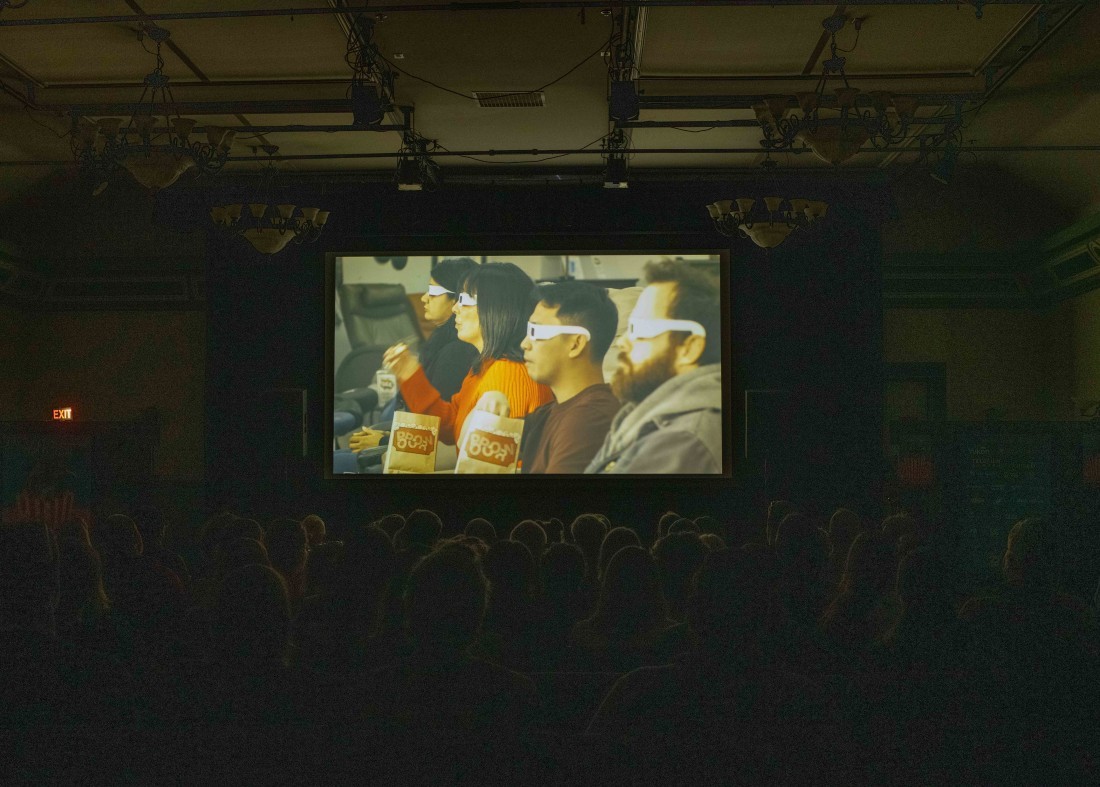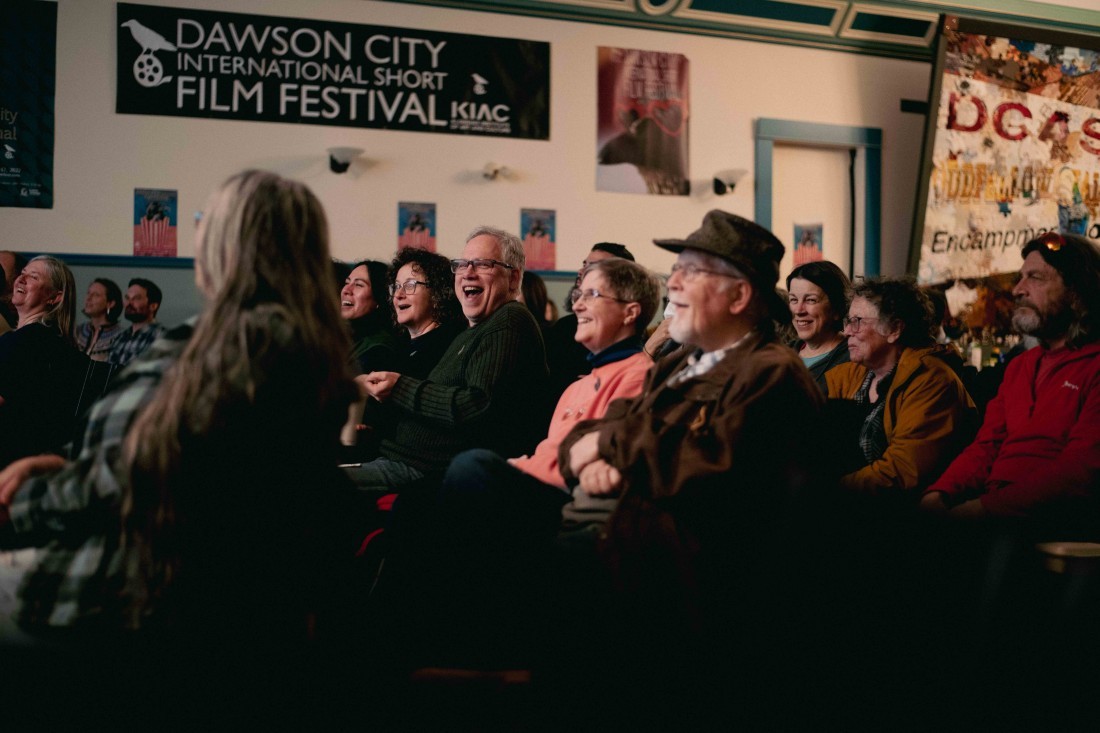Dawson City International Short Film Festival
Thursday of the Easter long weekend there is a certain buzz in the pub attached to Bombay Peggy’s hotel in Dawson City, Yukon. Alongside locals, visitors sip on martinis and peruse the brochure circulated by the Klondike Institute of Art and Culture (KIAC) detailing the program for the Dawson City International Short Film Festival. Celebrating its 25th anniversary, the four-day festival includes 11 film screenings, an outdoor projection, a curated video exhibition, a film workshop, artist talks, a street festival, and plenty of time for visitors and filmmakers to network, engage and discuss work. Of the 90 films selected, over a third are made in the Yukon or by Yukon filmmakers, highlighting a range of production and offering audiences from away the opportunity to view works often not circulated to the rest of the country. The programs are loosely arranged thematically and include a children’s program and an Indigenous program screened in the Dänoja Zho Cultural Centre. The festival also gives out several awards, most notably the Made in Yukon Professional Award, Emerging Artist Award and the Lodestar (best film from away). Deservedly this year’s winners were Douglas Joe for Datrin (Raven), a quietly moving film imagining the last fluent speaker of the Gwich’in language; Jake Armstrong’s quirky hand-processed tale Ungulatide, made for the Yukon 48-hour film challenge; and Claire Sanford’s Violet Gave Willingly, a gentle, probing narrative that looks at past violence alongside making and rebuilding.

Opening screening in the Dënäkär Zho/KIAC Ballroom, 25th Dawson City International Short Film Festival, 2024, Dawson City. Film image: Jessica Hall, Observational Film, 2923, narrative film, 3 minutes. Photo: Miriam Behman. Courtesy Dawson City International Short Film Festival, Dawson City.
Opening night featured a series of films chosen from past People’s Choice awards. In many ways these films showcased works typical of the festival’s themes: the land; loss; connection and destruction; documentary and fictional Indigenous accounts; poignant, bittersweet narrative stories; sharply humorous animation; and what I like to call Dawson-specific sci-fi/absurdity. Distributed throughout the different programs, these themes are variously presented as documentary, narrative, experimental and created by emerging and established artists.
Odes to the land can be found in the experimental film Kin by Marie Hammje, Bruce Thomas Miller, Agathe Bachellier and Matthew Ingraham; Evening Escapades, an animated collaboration between Darcy Tara McDiarmid and Chantal Rousseau; Askatin (it freezes up), a video poem by Charles Atlas Sheppard and Heidi Marion; and River, a hand-processed experimental film by Penny McCann. Critical approaches to land and land abuse are addressed in Nature Nurture by Arcane Perry, KJ Edwards’s future ready: cusp, and Jeff McKay and Takashi Iwasaki’s sharp condemnation of human interventions in Shitty Little.
In addition to Douglas Joe’s Datrin, Indigenous films that particularly resonated included Lindsay McIntyre’s Nigiqtuq (The South Wind). Set in the 1930s, it retells the true story of an Inuit mother and her daughter as they struggle to assimilate after being brought south by a Canadian police officer. Carrie Davis’s struggle to overcome the aftermath of being forcibly removed from her family at the end of the ’60s scoop in Double M Country and Len Morissette’s yearning to connect to his Metis heritage in The Politics are different stories of searching and reconnecting. Terril Calder’s stop-motion film A Bear Named Jesus looks at religious interference and estrangement. Humour runs through all three of these last-mentioned films, and is particularly present in Calder’s bittersweet musings on strange companions and living with the loss of someone still present.
The most impactful narrative films included Millefiore Clarkes’s Evelyn about a 94-year-old woman in PEI, and Raquel Sancinetti’s Madeleine, a tale of friendship between two women who are 57 years apart, told in segments that move between animation and documentation. Maya Costa’s Mangata transforms the trauma of a girl’s experience of losing her father at sea while attempting to cross the ocean from Africa to Europe, and encountering his spirit years later when she lands on the moon as an astronaut. Alexandra Myotte and Jean-Sébastien Hamel capture the pain of loss and adolescent struggle in the animation A Crab in the Pool, and Érik K Boulianne’s Making Babies recounts the trials and failures of trying to conceive.
There is also plenty of humour to be found throughout the festival: some of it to soften edges as in Calder’s film, some of it to address gender equality as in the coming-of-age tale Death to the Bikini! by Justine Gauthier. There are also wildly funny films like Dylon Michael James Klemen-Hurrell’s Cup of Joe where an animated bean is explosively affected by a sip of coffee, and Jessica Meier, Kilian Feusi and Sujanth Ravichandran’s Pipes in which a plumber called to an emergency finds himself in a gay fetish club. Dawson City sci-fi rounds out the program with Craig Hunter’s Rerouting, wherein a tourist’s GPS switches to the local that guides him to his hotel via the streets and characters of Dawson City.

Closing night crowd, 25th Dawson City International Short Film Festival, 2024, Dawson City. Photo: Miriam Behman. Courtesy Dawson City International Short Film Festival, Dawson City
Clearly, many of the Indigenous films and ecological critiques can be argued to be political, but generally the festival steers clear of issue-driven narratives. Two notable exceptions are Alexia Tsouni’s short film Hantush – a fairytale, a tale of a 14-year-old Palestine refugee girl trying to stave off Israeli bulldozers, and Katherine Adams’s Mixed Memories that looks at the complexities of identity through the lens of three BIPOC women.
The fact that the festival is celebrating its 25th anniversary, and has grown from receiving an initial 65 submissions to currently 400, speaks to the importance of the event. The prominence of Yukon films highlights the creative and cultural community in the North and the unique stories and landscapes that reside there. Showing Canadian films culled literally from coast to coast to coast serves to knit together a national community, while the inclusion of so many Indigenous films, films produced by Wapikoni Mobile, and the festival’s commissioning of five films by Tr’ondëk Hwëch’in filmmakers through KIAC’s Dënäkär Zho Film Lab, makes the festival feel fresh, relevant and current. ❚
Dawson City International Short Film Festival was presented by the Klondike Institute of Art and Culture, Dawson City, from March 28, 2024, to March 31, 2024.
Corinna Ghaznavi is an independent curator and freelance writer based in Grey County, Ontario.

